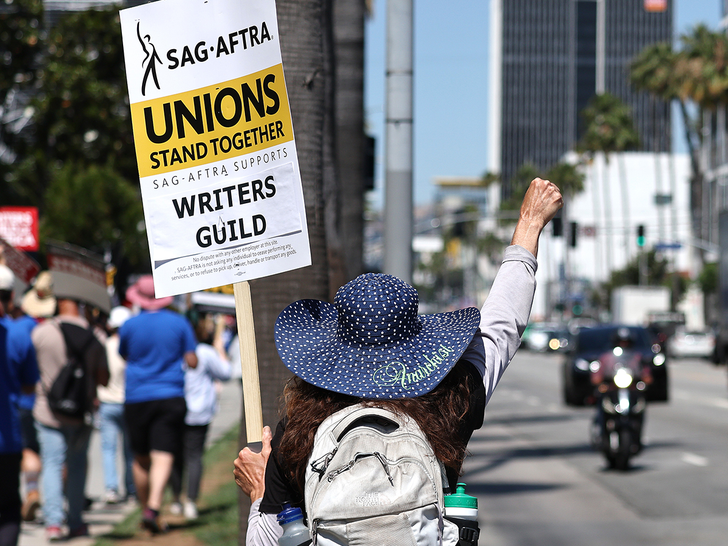Hollywood Shutdown: Writers And Actors On Strike, Impacting Film And Television

Table of Contents
H2: The Roots of the Hollywood Shutdown: Why the Strikes Began
The Hollywood shutdown isn't a spontaneous event; it's the culmination of years of simmering discontent within the entertainment industry. Two powerful unions, the Writers Guild of America (WGA) and the Screen Actors Guild - American Federation of Television and Radio Artists (SAG-AFTRA), have taken to the picket lines demanding significant changes to their working conditions and compensation.
H3: Writers' Strike: Key Demands and Grievances
The WGA's strike stems from several key grievances, primarily centered around the changing landscape of the entertainment industry and the rise of streaming platforms. Their demands include:
- Fair wages and residuals in the streaming era: Traditional television models provided writers with residuals based on reruns and syndication. Streaming services often lack these structures, leaving writers with significantly less compensation for their work.
- Protection against AI-generated content replacing writers: The WGA is deeply concerned about the potential for AI to replace human writers, threatening their livelihoods and the creative integrity of storytelling. They're demanding safeguards against this technology.
- Improved working conditions: The demands include better minimum staffing levels on productions, preventing excessive working hours, and ensuring fair treatment of writers.
Specific demands detailed in the WGA's proposal include minimum staffing levels on television series, increased transparency in streaming viewership data and its impact on compensation, and regulated use of AI in the writing process.
H3: Actors' Strike: Joining the Fight for Fair Compensation
SAG-AFTRA's strike joined forces with the WGA, amplifying the impact of the Hollywood shutdown. Their concerns mirror those of the writers, focusing on fair compensation and the ethical implications of emerging technology. Key demands include:
- Fair wages and residuals, especially for streaming content: Similar to the writers, actors are struggling with inadequate compensation for streaming work, lacking the traditional residuals that accompanied broadcast television.
- Concerns about the use of AI in creating digital doubles: Actors worry about studios using AI to create digital likenesses, potentially reducing their employment opportunities and eroding their control over their own images.
- Protecting actors' image and likeness rights: The union is seeking clearer and stronger protections to ensure actors receive appropriate compensation and consent for the use of their images and likenesses.
SAG-AFTRA's strike also includes specific demands related to self-tape auditions, shorter contracts, increased transparency in streaming revenue sharing, and protections against the unauthorized use of AI-generated performances.
H3: The Interconnectedness of the Writers' and Actors' Strikes
The simultaneous strikes by the WGA and SAG-AFTRA represent a powerful show of solidarity. The interconnected nature of their work means that one strike significantly impacts the other. Without writers, actors have no scripts; without actors, writers' scripts cannot be filmed. This united front has greatly increased their bargaining power, creating a much larger impact on the industry than either strike could have achieved alone. This unprecedented level of unified action highlights the shared concerns and the urgent need for industry-wide reform.
H2: The Impact of the Hollywood Shutdown on the Industry
The Hollywood shutdown isn't just affecting those directly involved; its effects ripple across the entire entertainment ecosystem.
H3: Delayed Film and Television Productions
The most immediate impact is the complete halt of numerous film and television productions. Major studios have announced delays and cancellations of projects, impacting everything from big-budget blockbusters to independent films and television series. The financial implications for studios and production companies are substantial, leading to projected losses and potential restructuring.
H3: Economic Ripple Effects Beyond Hollywood
The economic consequences extend far beyond the studios and production companies. Related industries, including catering, transportation, and post-production services, are facing significant job losses and economic hardship. The Hollywood shutdown is impacting countless workers and local economies across the country, creating a wider economic ripple effect with potentially long-term consequences for the U.S. economy.
H3: The Changing Landscape of Film and Television
The strike could be a catalyst for significant changes in the film and television industry. It might accelerate the shift towards streaming, but it could also lead to necessary reforms in compensation structures and contracts. The negotiations will likely reshape the power dynamics between studios and unions, ultimately influencing how content is created, distributed, and compensated for in the years to come.
H2: Potential Resolutions and the Future of the Hollywood Shutdown
The resolution of the Hollywood shutdown hinges on successful negotiations between the unions and the Alliance of Motion Picture and Television Producers (AMPTP).
H3: Negotiating a Settlement: Key Issues and Challenges
Reaching a compromise presents significant challenges. The core issues—fair compensation, AI usage, and improved working conditions—require complex solutions. The possibility of mediation or arbitration remains an option, but the ultimate success of the negotiations depends on both sides finding common ground.
H3: Long-Term Impacts on the Entertainment Industry
The long-term impacts of this Hollywood shutdown could be transformative. It might reshape the industry's power dynamics, leading to fairer labor practices and updated contracts that better reflect the realities of the modern entertainment landscape. The effects on creativity and content production are yet to be fully understood, but the strike is undoubtedly leaving an indelible mark on the future of filmmaking and television.
3. Conclusion:
The Hollywood shutdown, fueled by the writers' and actors' strikes, is a momentous event with far-reaching implications. The core issues of fair compensation, AI safeguards, and improved working conditions highlight the urgent need for the industry to adapt to the changing times. While the resolution remains uncertain, this significant industry-wide work stoppage has already ignited a crucial conversation regarding fair labor practices and the future of creative content. Understanding the complexities of this Hollywood shutdown is paramount for anyone following the evolution of film and television. Stay informed about the ongoing developments in this Hollywood shutdown and advocate for fair labor practices within the entertainment industry.

Featured Posts
-
 Mission Impossible Dead Reckoning Part Twos Super Bowl Trailer A Closer Look
Apr 26, 2025
Mission Impossible Dead Reckoning Part Twos Super Bowl Trailer A Closer Look
Apr 26, 2025 -
 Potential Concerns Regarding Deion And Shedeur Sanders A Browns Insiders View
Apr 26, 2025
Potential Concerns Regarding Deion And Shedeur Sanders A Browns Insiders View
Apr 26, 2025 -
 Todays Nyt Spelling Bee Puzzle 360 Feb 26th Hints And Answers
Apr 26, 2025
Todays Nyt Spelling Bee Puzzle 360 Feb 26th Hints And Answers
Apr 26, 2025 -
 The Shedeur Sanders Nfl Draft Espn Analysts Insight On Deion Sanders Evaluation
Apr 26, 2025
The Shedeur Sanders Nfl Draft Espn Analysts Insight On Deion Sanders Evaluation
Apr 26, 2025 -
 Mv Callaway Parker Successful Delivery By Verret To Ptc
Apr 26, 2025
Mv Callaway Parker Successful Delivery By Verret To Ptc
Apr 26, 2025
